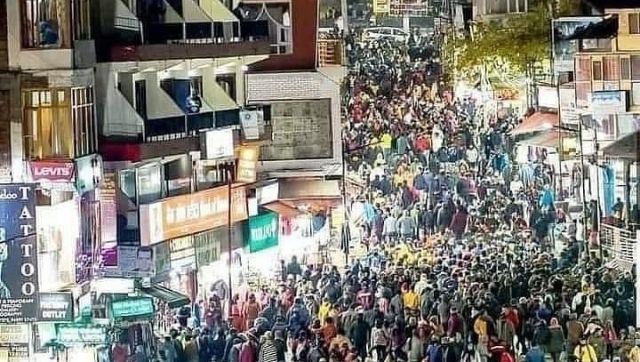News and photos of tourists in Manali and other hill stations in Himachal Pradesh, Uttarakhand, and Jammu & Kashmir have gone viral, shocking people and raising concerns about a third wave of the coronavirus pandemic, as people walk around flouting social distancing rules and are maskless. Dr Balram Bhargava, director general of the Indian Council of Medical Research (ICMR) called the pictures “frightening.”
Pics from #Manali, where beds are running out in hotels. If we go on like this, soon there will be another episode of "No beds in Hospital" will hit the reality soon!
— 𝐒𝐮𝐜𝐡𝐢𝐭𝐡𝐫𝐚 𝐒𝐞𝐞𝐭𝐡𝐚𝐫𝐚𝐦𝐚𝐧 (@suchisoundlover) July 4, 2021
I know it's hard not to go out and all, but people this pandemic is a real nightmare. Please be responsible 🤦🏻♀️ pic.twitter.com/174HoHG48F
In response to the visuals, Joint Secretary of the Health Ministry Lav Agarwal referred to the phenomenon as ‘revenge travel’ and added: “People are indulging in revenge travel. Some photos coming in from Manali, Mussoorie, Sadar Bazar Delhi, Shimla, Laxmi Nagar Delhi, Dadar Market show a huge crowd with no mask roaming around. This is dangerous. People need to understand this is a continuous fight. The virus is not exhausted it is still there. Only Covid-appropriate behaviour can control the virus.”
#WATCH | Tourists throng Manali town in Kullu district as Himachal Pradesh government eases COVID restrictions pic.twitter.com/snIiwfcIo5
— ANI (@ANI) July 5, 2021
After months of heavy restrictions imposed because of the rising COVID-19 cases during the second wave, there’s been a decline in daily active cases, leading to the partial lifting of these restrictions, and revenge travel has seen an uptick. What is revenge travel? After over a year in lockdown, several people have become tired of the monotony and are looking for a change in environment. With the coming of the vaccine, many people are optimistic about travelling, despite the fact that not everyone has been vaccinated yet. This urge to travel after being cooped up in lockdown for over a year, despite the dangers it poses, is called revenge travel. Besides the frustration of wanting to get out, there’s also the frustration caused by the hot climate that has pushed tourists to pursue holidays in nearby hill stations. A study conducted by Booking.com stated that 72 percent people feel that travelling this year is more important to them than it was before the pandemic. It also found that of the people who couldn’t travel in 2020, 68 percent are yearning for the opportunity to travel this year. Travel website MakeMyTrip has also noticed an almost 200 percent jump in hotel bookings ever since restrictions began to ease. “We expect the increased momentum of the vaccination drive and reduced caseloads to catalyse domestic travel recovery in the next two quarters,” said Cleartrip VP Rajiv Subramanian. The dangers of revenge travel Many are concerned that as a result of this revenge travel, a third wave is on the way. As Agarwal said, even though we might be exhausted, the virus is not, it’s still around. A recent survey also found that 83 percent people have failed to comply with COVID-19-appropriate behaviours and 63 percent people aren’t maintaining proper social distancing. Although there’s been a general decline in the number of cases, India still reported around 43,000 new cases today — a reminder that the most important way forward is with appropriate social distancing and other norms like wearing masks and staying indoors as much as possible.


)
)
)
)
)
)
)
)
)



